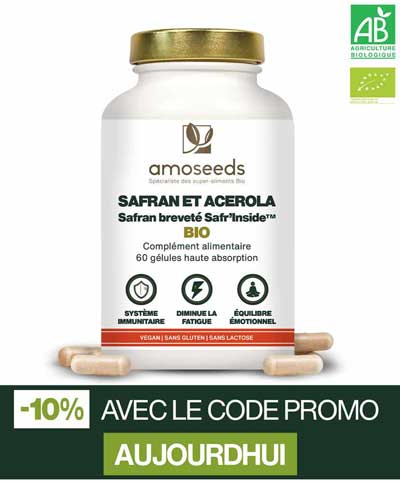Native to South America, acerola is a tangy red fruit, which resembles a small, shiny cherry. The benefits of acerola (in organic version) are comparable to those of a commercial polyvitamin… Except that the acerola is 100% natural! Its only flaw: it costs between 170 and 200 euros per kilo!
IDENTITY RECORD
Name : Acerola, cherry from Barbados, cherry from the West Indies
Family: Malpighiaceae
Scientific name : Malpighia emarginata
Varieties: Manoa Sweet, Ruby Tropical, Hawaiian Queen, Jumbo Rouge, F. Haley, Maunawili
Caloric value: 32 kcal / 100 g
High season: July – December (calendar)
Producers: Brazil, Peru, Venezuela
France: no
Storage: 2 days in the refrigerator, several months for dried fruits
Where to buy organic acerola in France?
Ultra rich in vitamin C (35 times more than an orange), this little “cherry” from South America (the acerola berry is less than 2 cm in diameter) is an explosive health cocktail. It is recommended in case of fatigue and stress, but also to prevent classic winter ailments such as the flu.
Acerola has a little secret
Acerola is unanimous among nutrition professionals as well as healthy food lovers. In the General public also, we do not hesitate to classify it among the superfoods alongside spirulina, goji berry, acai berry, blueberry, or chia seed.
His little secret is to be (in addition) full of flavonoids, which ensure good assimilation of the vitamin C it contains (admit that this is good!) in the cells of the body.
In view of its benefits, acerola was traditionally used by Amazonian Indians to fight against diarrhea, the dysentery and the liver problems. And, with supporting studies, we now praise its exceptional properties for strengthening the immune system and eliminating toxins.
Acerola has a mind-blowing content of vitamin C : a dose of 100 g of its pulp contains on average 1.8 g of ascorbic acid.
The Spanish conquistadors of the 16th century were quick to use acerola juice to prevent the risk of scurvy (a fatal disease linked to a vitamin C deficiency) during their transatlantic crossings.
In addition to vitamin C, acerola is generously provided in beta-carotene (vitamin A), vitamin B1, vitamin B2 and vitamin B6. It also contains major minerals (magnesium, potassium, phosphorus, calcium) and trace elements such as iron.
The endless list of benefits of acerola
Acerola, powdered dried fruits or in fresh fruit juice, is known to fight against:
- Dysentery (infectious disease causing severe diarrhea)
- Anemia (low number of red blood cells in the blood)
- Scurvy (vitamin C deficiency)
- Fatigue and winter infections like the common cold or the flu.
But acerola still has many other virtues :
- It stimulates the immune system.
- It has anti-inflammatory action.
- It protects the body from harmful effects of fats.
- It reduces the level of sugar in the blood.
- It slows down the aging of skin cells.
- It eliminates toxic agents inhaled or absorbed: lead, cadmium, mercury, nickel, etc.
- It accelerates the healing of wounds.
- It maintains the bone structure and helps strengthen the teeth.
- It regulates blood pressure and certain hormones that help you relax and reduce stress.
How to use acerola?
To enjoy the benefits of acerola, it can be consumed in juice, dried fruit or dietary supplement in the form of chewable tablets, powders or capsules.
Due to its very high vitamin C content, the maximum recommended dose corresponds to 1 g / day of the fruit pulp.
Judge for yourself: a single tablet can provide 225% of daily intake recommended in vitamin C. In addition, ascorbic acid is not an stimulant so acerola, ingested alone, has no negative effect on sleep.
If you choose the powdered acerola, make sure that the powder is not colored but well orange-yellow. Some acerola powders sold commercially offer a rosé product. Check the composition carefully and track down any synthetic vitamins.

ACEROLA & ORGANIC SAFFRON, SAFR’INSIDE ™, 17% VITAMIN C
Reclosable recyclable box of 60 capsules of 403mg of organic acerola extract titrated with 17% vitamin C and extract of organic saffron patented Safr’Inside ™ of Superior Quality amoseeds.
Click here to discover this product
Side effects and contraindications
Excessive consumption of vitamin C contained in acerola can cause diarrhea, abdominal pain, and nausea.
Acerola can increase uric acid levels, for this reason it is contraindicated in people with gout or who may have kidney stones.
Have you ever tested the benefits of acerola and if so, in what form? And for what benefits? Tell us in the comments.













